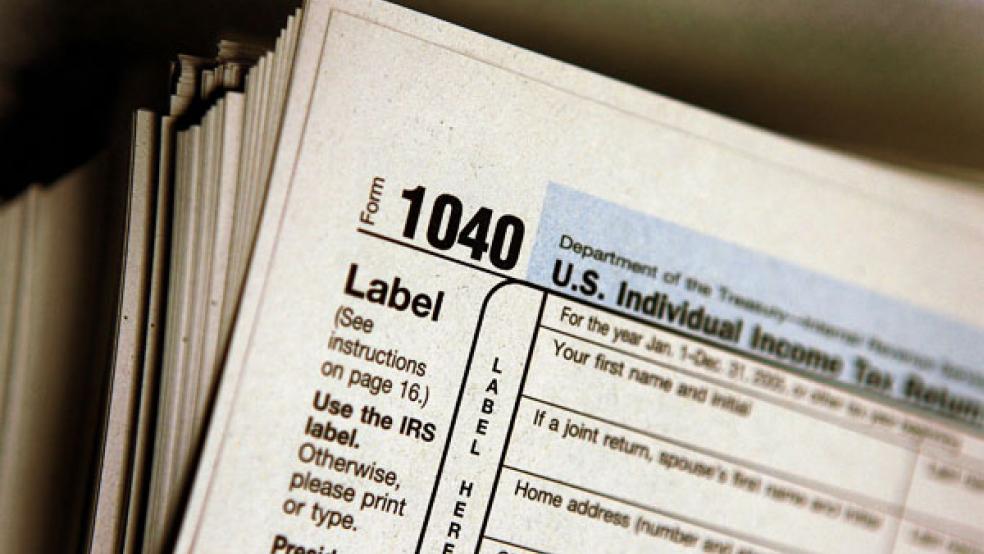Willie Sutton famously said he robbed banks "because that's where the money is." And if Obamacare boosters want to get the uninsured to sign up, in great numbers, they might want to go "where the uninsured are." A new study suggests that place may be their tax preparer's office.
The analysis urges government officials to "seriously explore" partnering with tax preparers to enroll people without health insurance in Obamacare plans, arguing preparers "could help most uninsured get covered" since they're already preparing returns for millions of them.
Related: Obamacare Victims Are ‘Liars,’ Says Top Democrat
That partnership could "secure a good mix of health participants, which would help promote a balanced risk pool and marketplace stability," said the Urban Institute paper, prepared with assistance from the Robert Wood Johnson Foundation. The analysis points out that 18.9 million uninsured people who qualify for Medicaid or Obamacare subsidies "will file a tax return next year, most with assistance from professional tax preparers."
"I'm not aware of any place in the world where you have as many eligible, uninsured people as in tax preparers' offices," said Stan Dorn, senior fellow in the Urban Institute's Health Policy Center, co-author of the analysis issued Thursday. The Urban Institute does not, as a matter of practice, take positions on policies it researches, but the Robert Wood Johnson Foundation does formally support the Affordable Care Act.
There are more tax preparers nationally than there are so-called Obamacare navigators, who are tasked with helping enroll people, Dorn said. And unlike Obamacare advocates who go door-to-door asking people to enroll, tax preparers are dealing with people literally walking into their office, he added.
The Urban Institute analysis found more than 74 percent of currently uninsured consumers who qualify for insurance subsidies plan to file federal income tax returns each year.
"This includes over 90 percent of consumers under age 35 who are eligible for subsidies to pay for" Obamacare plans, the paper said. That age group is highly sought after by insurers selling such plans because of their desire to balance the risk that comes with insuring older enrollees, who are more apt to have health issues.
Related: Obamacare Penalty – 4 Things You Don’t Know
The analysis comes as major tax preparers Jackson Hewitt and H&R Block are actively directing customers to Web brokers selling Obamacare plans if they want help enrolling. It also comes as the federal government is on the brink of deciding whether to expand the period for open enrollment in Obamacare plans taking effect in 2015.
Two months ago, the leading government health agency recommended that open enrollment for coverage next year take place between Nov. 15, 2014, and Jan. 15, 2015—the current deadline for this plan year is March 31.
That short, two-month window—four months less than the current total enrollment period—has drawn criticism from some tax experts who say it will force people to decide on whether to enroll during the holidays, when they're cash-poor, as opposed to when they're most cash-rich, during tax-refund season.
"This is really a very live issue right now," said Dorn, who expects the federal government to issue a final rule on the 2015 enrollment period within weeks.
"If I were king," Dorn said he would set Obamacare's next open-enrollment period "from maybe Feb. 1 through mid-April"— effectively tax-filing season—for 2015.Acknowledging that is unlikely, Dorn said he would at least like to see the window open as scheduled in November and then continue until at least March 31, 2015. Dorn's analysis notes that more than about 61 percent of tax returns are filed with the IRS by March 31 each year.
Brian Haile, who heads tax preparer Jackson Hewitt's Obamacare-related efforts, has argued for months that the federal government made a mistake by beginning open enrollment for 2014 Obamacare policies on Oct. 1, right before the Christmas shopping season, calling it "nuts." Haile told CNBC.com, "I know for a fact there are discussions in Washington" about extending next year's open enrollment so that it doesn't end in mid-January, precisely because of the risk that a short enrollment period that essentially overlaps the holiday season could depress sign-ups.
If the government does not extend the open enrollment period for next season, "the newspapers will be filled with stories of people screaming," Dorn said.
That's because tax season will help drive home the threat of a tax penalty for not having health coverage. The penalty—which is as much as 1 percent of a person's income for not having coverage in 2014—will be deducted from any refund they are due.
When the uninsured see the size of their tax penalty and realize it rises to as much as 2 percent of income in 2015, they will "want to get insurance," but their tax preparer will tell them "they're locked out" because enrollment ended in mid-January, Dorn said. "By contrast, if open enrollment extends to March 31, then people can sign up and avoid paying the penalty at the very moment the penalty is most of an incentive to them," Dorn said.
This article originally appeared in CNBC.
Read more in CBNC:




